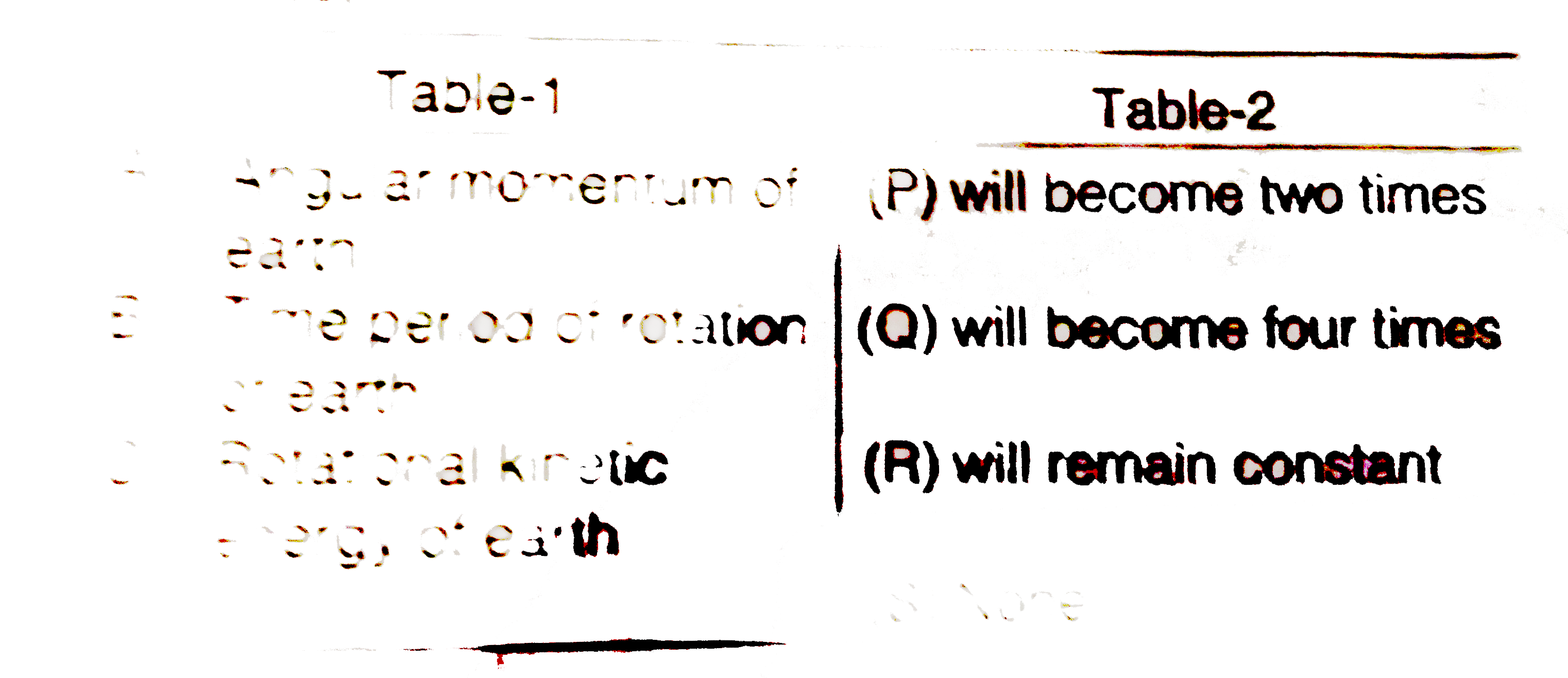If the earth, were suddenly contracted to (l/n)th of its present radius without change in its mass, then what will be the effect on the duration of the day.
To solve the problem of how the duration of the day changes if the Earth contracts to 1nth of its present radius without a change in mass, we can follow these steps:
1. Understand the relationship between time period and radius:
The time period T of the Earth's rotation is related to its radius R. The formula for the time period of rotation is given by the relationship:
T∝R2
This means that the time period is directly proportional to the square of the radius.
2. Define the present time period:
The current duration of the day (time period) is given as:
T=24 hours
3. Determine the new radius:
If the Earth contracts to 1nth of its present radius, the new radius R′ can be expressed as:
R′=Rn
4. Relate the new time period to the new radius:
Let the new time period after contraction be T′. Since the time period is proportional to the square of the radius, we can write:
T′∝(R′)2=(Rn)2=R2n2
5. Express the new time period in terms of the old time period:
Since T∝R2, we can write:
T′=k⋅R2n2
where k is a constant of proportionality. From the original relationship, we know:
T=k⋅R2
Therefore, we can express T′ in terms of T:
T′=Tn2
6. Substitute the known value of T:
Substituting T=24 hours into the equation gives:
T′=24n2 hours
Final Answer:
The new duration of the day, T′, after the Earth contracts to 1nth of its radius is:
T′=24n2 hours
The time period T of the Earth's rotation is related to its radius R. The formula for the time period of rotation is given by the relationship:
T∝R2
This means that the time period is directly proportional to the square of the radius.
The current duration of the day (time period) is given as:
T=24 hours
If the Earth contracts to 1nth of its present radius, the new radius R′ can be expressed as:
R′=Rn
Let the new time period after contraction be T′. Since the time period is proportional to the square of the radius, we can write:
T′∝(R′)2=(Rn)2=R2n2
Since T∝R2, we can write:
T′=k⋅R2n2
where k is a constant of proportionality. From the original relationship, we know:
T=k⋅R2
Therefore, we can express T′ in terms of T:
T′=Tn2
Substituting T=24 hours into the equation gives:
T′=24n2 hours
The new duration of the day, T′, after the Earth contracts to 1nth of its radius is:
T′=24n2 hours
Topper's Solved these Questions
- CIRCULAR MOTION BOOK - ICSECHAPTER - CIRCULAR MOTION EXERCISE - MODULE 2 (FROM EQUATIONS OF ROTATIONAL MOTION)
8 Videos
- CIRCULAR MOTION BOOK - ICSECHAPTER - CIRCULAR MOTION EXERCISE - MODULE 2 (FROM CENTRE OF MASS)
8 Videos
- CIRCULAR MOTION BOOK - ICSECHAPTER - CIRCULAR MOTION EXERCISE - MODULE 2 (SHORT ANSWER QUESTIONS)
35 Videos
- COMPETITION CARE UNITBOOK - ICSECHAPTER - COMPETITION CARE UNITEXERCISE - OBJECTIVE QUESTIONS FROM PREVIOUS IAS EXAMINATIONS
50 Videos
Similar Questions
If radius of the earth contracts to half of its present value without change in its mass, what will be the new duration of the day?
View SolutionIf radius of the earth contracts to half of its present value without change in its mass, what will be the new duration of the day?
View SolutionIf the radius of the earth contracts to half of its present value without change in its mass, what will be the new duration of the day?
View SolutionIf the radius of the earth contracts to half of its present value without change in its mass, what will be the new duration of the day?
View SolutionIf earth suddenly contracts to half of its present radius keeping its mass constant what would be the length of the day?
View SolutionIf earth suddenly contracts by 1/2 of its present radius by how much would the day be decreased ?
View SolutionIf radius of earth is reduced to half without changing its mass,

View SolutionSuppose the earth stops rotating about its axis what will be its effect on the weight of a body.
View SolutionIf the earth suddenly shrinks (without changing mass) to half of its present radius, then acceleration due to gravity will be
View SolutionIf earth is 1/4 of its present distance formt he sun, then what is the duration of the year?
View Solution
